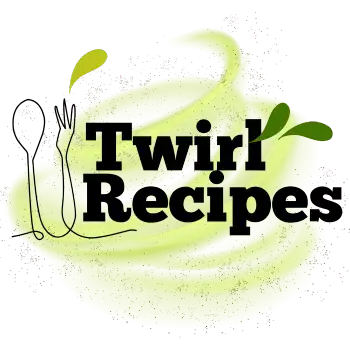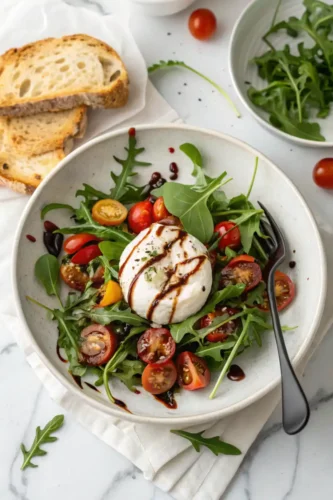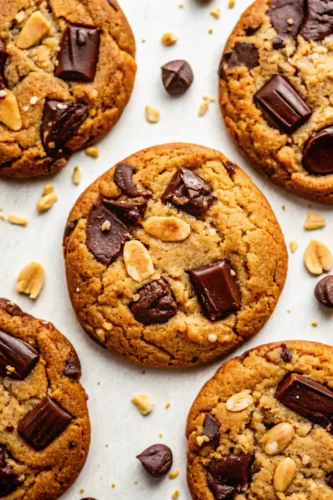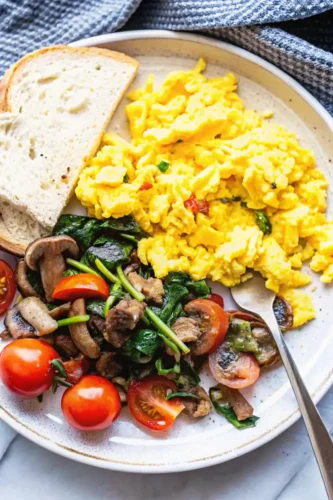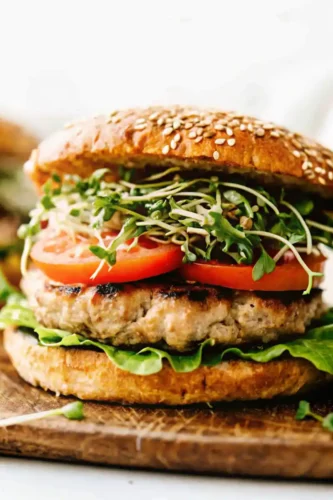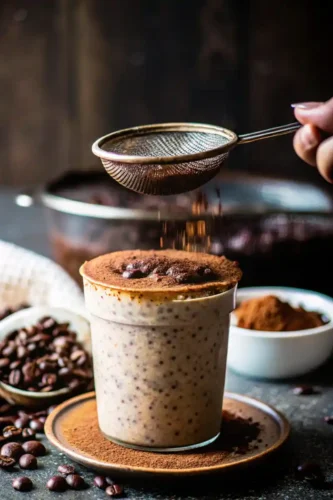Gluten-Free Cupcakes have become one of my favorite recipes to share—not just because they’re delicious, but because of what they represent. A few years ago, someone close to me started struggling with gluten, and I saw firsthand how hard it was to give up the little joys, like a soft, sweet cupcake at a birthday or family gathering.
That’s what pushed me to experiment in the kitchen. I wanted to create a treat that didn’t feel like a compromise. After many trials (and lots of messy bowls), I finally found the right balance. These cupcakes are moist, fluffy, and full of flavor—everything a cupcake should be, minus the gluten.
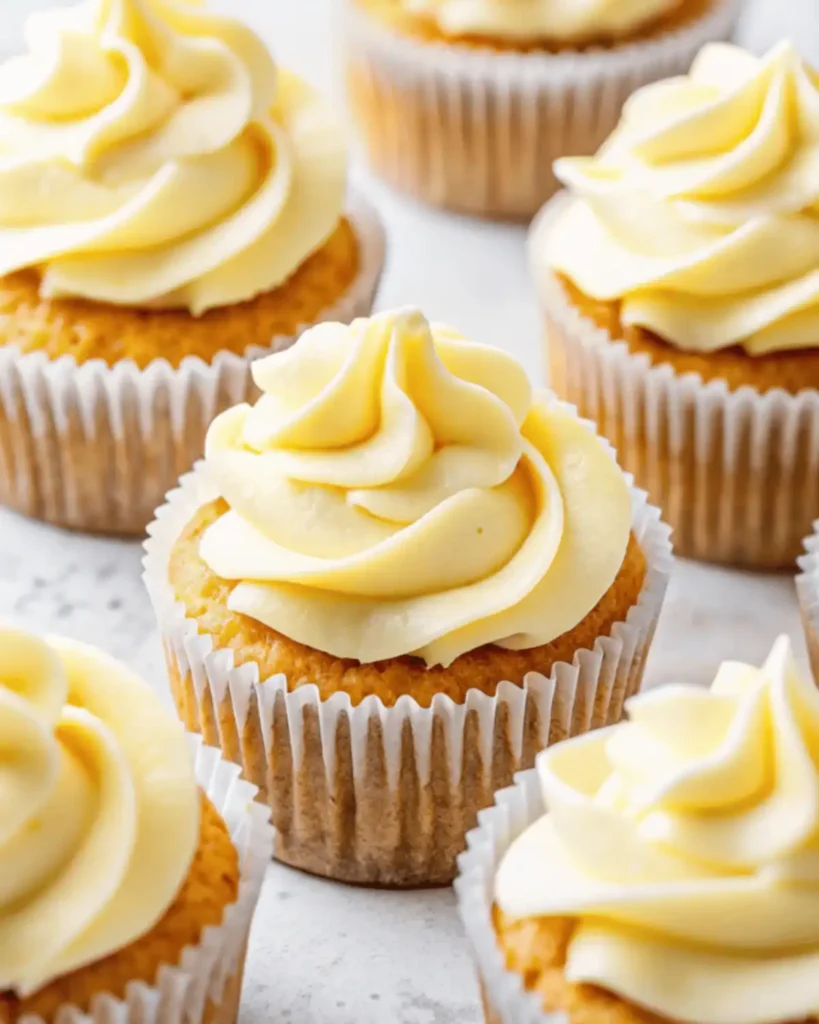
Now, every time I make these gluten-free cupcakes, I feel proud. They’re a reminder that everyone deserves a little sweetness, no matter their dietary needs. Whether you’re new to gluten-free baking or just looking for a crowd-pleasing recipe, you’re going to love these.
Table of Contents
What Makes Gluten-Free Cupcakes Special
Gluten-free cupcakes aren’t just regular cupcakes minus the gluten—they require a smarter, more thoughtful approach. Here’s why they’re unique (and delicious!):
- No Gluten, No Problem
Traditional flour gives cupcakes structure. Without it, you need a smart replacement—like a 1:1 gluten-free flour blend—to mimic the same rise and softness. - The Power of Xanthan Gum
This secret weapon acts like gluten, helping your batter hold together. It keeps cupcakes from falling apart and improves crumb texture. - Moisture Matters
Gluten-free flours absorb more liquid, so it’s essential to add ingredients that retain moisture:- Coconut oil or neutral vegetable oil
- Unsweetened applesauce
- Yogurt or buttermilk alternative (non-dairy milk + vinegar)
- Let the Batter Rest
Give it 15–30 minutes before baking. This simple trick allows gluten-free flours to fully hydrate, creating a softer, more tender crumb. - Flavor Without Limits
With the right blend, you won’t even miss the wheat. These cupcakes are sweet, satisfying, and ideal for anyone avoiding gluten.
Ingredients You’ll Need
You only need a handful of simple ingredients to make these delicious gluten-free cupcakes. Here’s a quick overview of what you’ll be using:
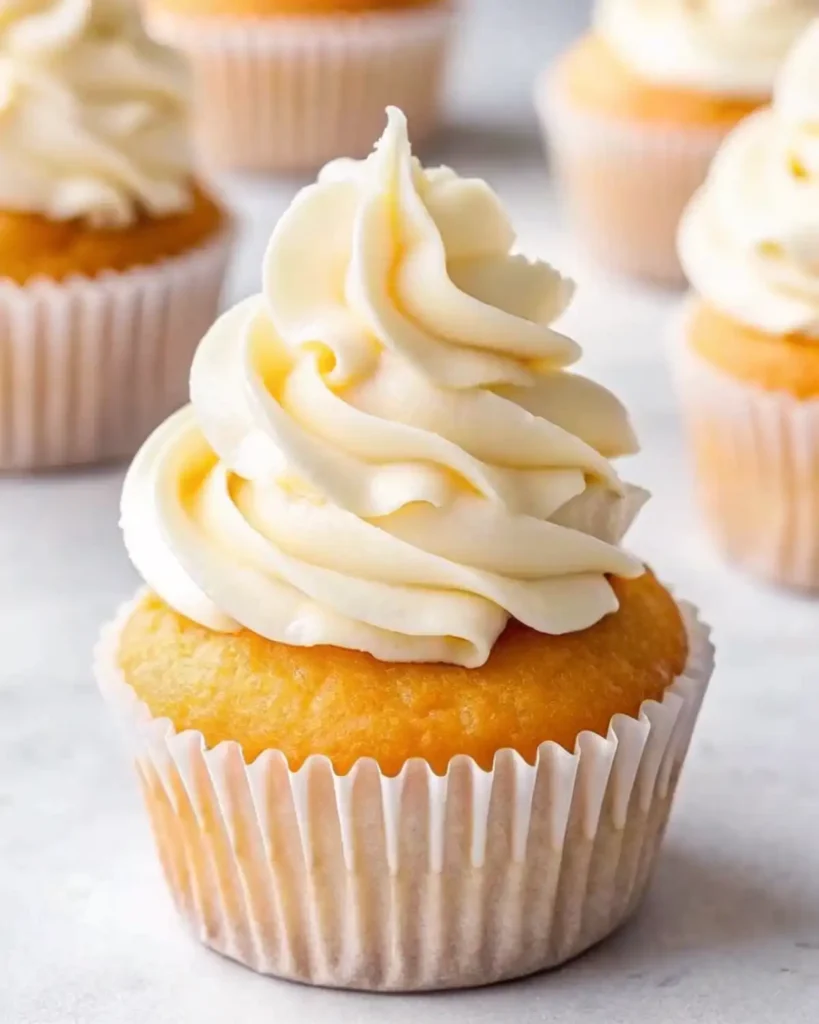
- Butter – Use unsalted, or a dairy-free option like Smart Balance ( If you’re exploring more dairy-free recipes, this swap fits right in)
- Sugar – Regular granulated sugar works best
- Eggs – For structure and moisture
- Vanilla Extract – Adds rich, classic flavor
- Gluten-Free All-Purpose Flour Blend – Choose one with xanthan gum (like Pillsbury or Bob’s Red Mill)
- Baking Powder & Salt – For lift and balance
- Milk – Use dairy or unsweetened almond, cashew, or coconut milk
For the frosting, you’ll need:
- Butter (or vegan substitute), vanilla extract, salt, confectioners’ sugar, and a splash of milk for consistency
These pantry staples come together to create incredibly moist, fluffy, and flavorful cupcakes—gluten-free and perfect for everyone.
Step-by-Step Instructions
Making gluten-free cupcakes is easier than you think. Here’s a quick rundown of how to get perfect results every time:
- Prep your oven to 350°F and line a muffin tin with cupcake liners.
- Cream butter and sugar until fluffy, then mix in eggs and vanilla.
- Whisk dry ingredients in a separate bowl: gluten-free flour, baking powder, and salt.
- Combine wet and dry, alternating with milk, until the batter is smooth.
- Let the batter rest for 15–30 minutes to hydrate the flour.
- Scoop and bake for 18–22 minutes, or until a toothpick comes out clean.
- Cool completely before adding the buttercream frosting.

With the right ingredients and just a few easy steps, you’ll have moist, tender, and delicious gluten-free cupcakes ready to enjoy.
Tips & Troubleshooting
Even with the best gluten-free recipes, a few common issues can pop up. Here’s how to make sure your cupcakes turn out perfect every time:
- Cupcakes Sinking in the Middle?
This usually means they’re underbaked or have too much leavening. Always test with a toothpick before pulling them out. Also, measure baking powder carefully. - Dry or Crumbly Texture?
Gluten-free flours absorb more liquid. To boost moisture, try adding a spoonful of applesauce or yogurt. Use eggs at room temperature, and don’t skip the resting time—it really helps. - Dense or Gummy Cupcakes?
Overmixing is the culprit. Mix just until ingredients are combined. Letting the batter rest also allows the flour to fully hydrate, leading to a softer crumb. - Cupcakes Sticking to the Liners?
Use high-quality parchment liners. If using standard paper liners, lightly spray them with cooking oil before filling. - Runny or Too-Sweet Frosting?
Make sure your butter is soft—not melted. Add powdered sugar gradually, and adjust the milk by teaspoons. Chill the frosting briefly if it’s too soft to pipe. - Uneven Cupcakes?
Distribute the batter evenly between liners. Use an ice cream scoop for consistency and better rise. - Flavor Too Mild?
Boost with a touch more vanilla extract or a pinch of salt in the frosting. Don’t be afraid to adjust small ingredients to match your preference.
With these gluten-free baking tips, you’ll avoid the most common mistakes and bake with confidence. Moist texture, great rise, and smooth frosting—every batch will be better than the last!
Storage & Freezing Instructions
Want to make these gluten-free cupcakes ahead of time? No problem—they store beautifully!
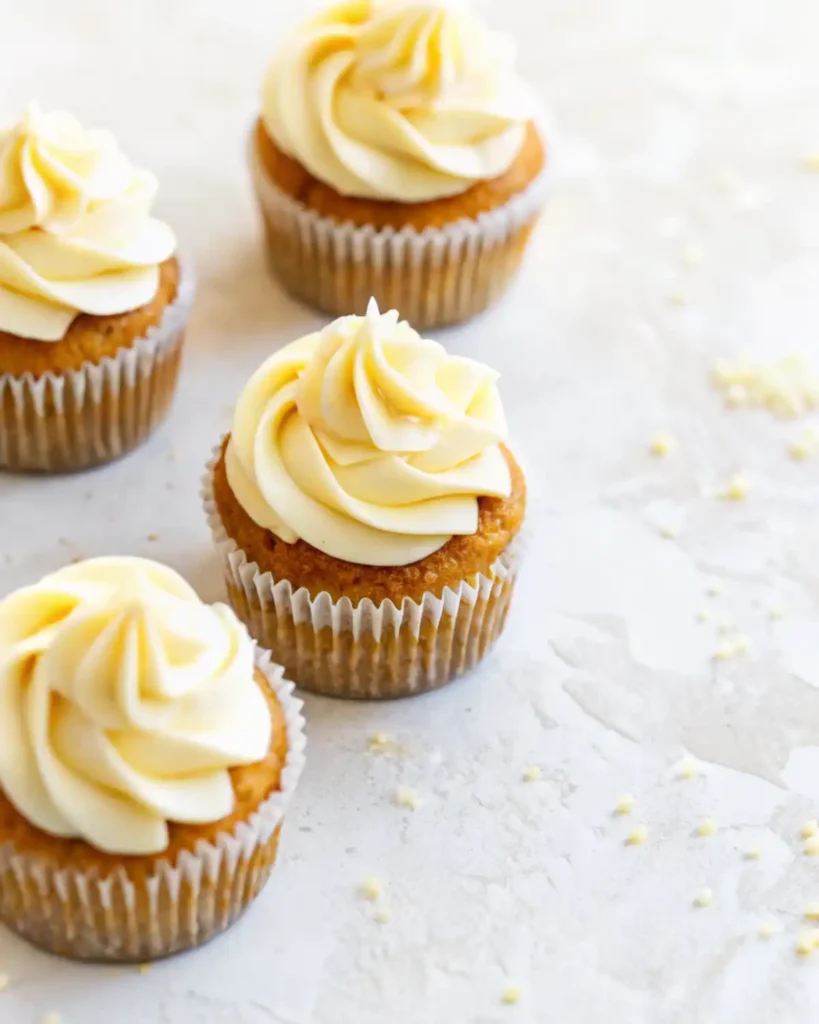
Room Temperature:
Store your frosted or unfrosted cupcakes in an airtight container at room temperature for up to 3–4 days. Keep them in a cool, dry place to maintain their moist texture and flavor.
Refrigeration:
If your kitchen is warm or humid, store them in the fridge. Just make sure they’re tightly covered so they don’t dry out. Bring them to room temperature before serving for the best flavor and texture.
Freezing:
Yes, you can freeze these cupcakes! Here’s how:
- Unfrosted cupcakes: Let them cool completely. Wrap each one individually in plastic wrap and place them in a freezer-safe bag or container.
- Frosted cupcakes: Freeze on a tray first, uncovered, then wrap once solid.
Frozen cupcakes stay fresh for up to 3 months. When you’re ready to enjoy, thaw them overnight in the fridge or at room temperature for a few hours.
With these easy storage tips, you can always have a batch of gluten-free cupcakes ready to go—perfect for parties, lunchboxes, or late-night cravings!
Try It & Share Your Twist!
Baked these gluten-free cupcakes? I’d love to see your creation! Tag me on Instagram or Facebook and show off your twist—whether it’s colorful frosting, fun decorations, or your secret ingredient. Let’s spread the joy of gluten-free baking, one cupcake at a time!
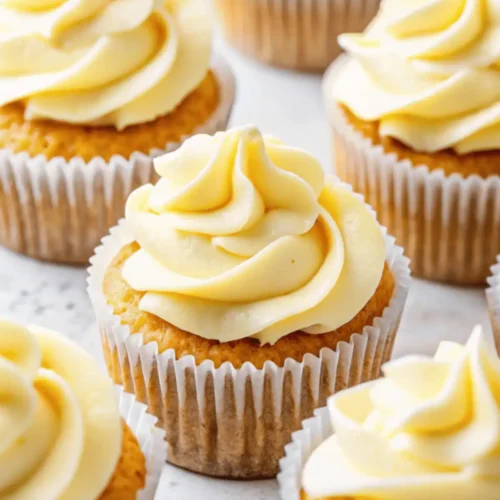
Gluten-Free Cupcakes (Vanilla flavor)
Ingredients
For cupcakes
- 6 tablespoons unsalted butter softened; use Smart Balance for dairy-free
- 3/4 cup granulated sugar
- 2 large eggs
- 1 tablespoon pure vanilla extract
- 1 1/4 cups gluten-free all-purpose flour blend with xanthan gum (e.g., Pillsbury)
- 1 3/4 teaspoons gluten-free baking powder
- 1/4 teaspoon salt
- 1 cup milk use almond, cashew, or coconut milk for dairy-free
For Buttercream Frosting
- 3/4 cup unsalted butter softened; for frosting; Smart Balance for dairy-free
- 1 tablespoon pure vanilla extract
- 1/4 teaspoon salt
- 4 cups confectioners’ sugar
- 3 tablespoons milk almond, coconut, or cashew milk for silky consistency
Instructions
For cupcakes
- Preheat oven to 350°F and line a 12-cup muffin tin with cupcake liners.
- Cream butter and sugar until fluffy. Beat in eggs and vanilla extract.
- In a separate bowl, whisk flour, baking powder, and salt.
- Gradually add dry ingredients to wet mixture, alternating with milk.
- Let batter rest for 15–30 minutes.
- Divide batter evenly among cupcake liners.
- Bake for 18–22 minutes or until a toothpick comes out clean.
- Cool for 5 minutes in pan, then transfer to rack to cool completely.
For Buttercream Frosting
- Beat butter until creamy. Add vanilla and salt.
- Mix in confectioners’ sugar gradually, then add milk until smooth.
- Frost cooled cupcakes and serve.
Notes
More Gluten-Free Dessert Recipes to Try!
Love these Gluten-Free Cupcakes? Don’t stop here—there’s a whole world of gluten-free dessert magic waiting for you. These recipes are full of rich flavor, soft textures, and total crowd-pleasers, whether you’re baking for dietary needs or just for the fun of it:
- Gluten-Free Carrot Cake Cupcakes
- Gluten-Free Puff Pastry
- Gluten-Free Pumpkin Bread
- Gluten-Free Biscuits
- Gluten Free Chocolate Cupcakes
Frequently Asked Questions
Do gluten-free cupcakes taste different?
They can, but in a good way! With the right gluten-free flour blend and ingredients, gluten-free cupcakes are just as delicious as traditional ones. They’re often described as having a lighter, slightly nuttier flavor due to blends that include almond or rice flour. Texture is key—when done right, you won’t even notice a difference. Many people say they actually prefer the moist texture and unique taste of a well-made gluten-free cupcake.
Can I make them gluten-free and dairy-free?
Absolutely! Just swap the butter with vegan butter (like Smart Balance), and use unsweetened almond, coconut, or cashew milk instead of dairy. The texture stays just as moist and fluffy. You can even frost them with dairy-free buttercream made from vegan butter and confectioners’ sugar. This makes the recipe perfect for guests with multiple dietary needs.
What is the difference between gluten-free cupcakes and regular cupcakes?
The main difference is the type of flour used. Regular cupcakes use wheat flour, which contains gluten—a protein that gives baked goods structure and elasticity. Gluten-free cupcakes use a special flour blend with ingredients like rice flour, almond flour, or tapioca starch. These blends require binders like xanthan gum to mimic gluten’s effect. As a result, baking gluten-free takes a little more precision, but the end result can be just as soft and flavorful.
Why are my gluten-free cupcakes chewy?
Chewy gluten-free cupcakes are often caused by overmixing or using a flour blend that lacks proper balance. Too much xanthan gum or not enough moisture can also lead to a dense, gummy texture. To fix this, use a trusted 1:1 gluten-free flour blend, let the batter rest before baking, and avoid over-stirring. Adding a bit of yogurt or applesauce can improve softness and crumb.
